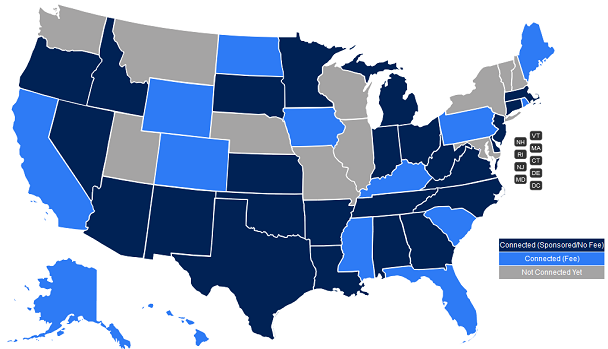

----- Blog Index / Benefits of Integrating your State’s PMP [MDToolbox Staff] [2021-03-15]

Most prescribers and dispensers use a prescription drug monitoring program (PMP, also referred to as PDMP) each time they write or dispense a prescription as part of the industry’s efforts to stem the opioid crisis. PMPs are electronic databases utilized in almost every state in the US, outside of Missouri. Each time a patient picks up a controlled substance prescription, pharmacies across the state log the prescription into the State database. Providers then refer to the database before prescribing to ensure other providers have not already recently prescribed similar medications for that specific patient. Effectively, PMPs help prescribers and dispensers keep track of patients at high risk of becoming opioid-dependent as well as assist in tracking patients that utilize potentially fraudulent or inappropriate prescriptions.
From 1999 to 2018, almost one quarter of a million Americans lost their lives due to prescription Opioid overdoses.[1] In recent years, the annual number of prescription opioid overdoses have begun to fall, but initial findings from State agencies over the past year show some of the largest increases of overdose deaths in history. This sudden increase appears to be in part due to the changes in healthcare and clinic shut-downs stemming from COVID-19.
Utilization of state PMPs is mandatory in most of the country. By law, a prescriber is required to login to the State’s database and do a check prior to writing a new controlled substance. See our State PMP Map for detailed information on which States require the State PMP be checked prior to prescribing controlled substances.
Empirical Data
A recently published study entitled “Association of Electronic Prescribing of Controlled Substances With Opioid Prescribing Rates”[2] detailed findings related to the electronic prescribing of controlled substances (EPCS) and mandatory PMP utilization and how it affects the rate of prescribing opioids. The study states:
“…the interaction between EPCS use and mandatory PDMP checking was not statistically significant, such that in both states with and without mandatory PDMP checking, greater EPCS use was associated with a greater number of opioid prescriptions per 100 persons. Specifically, a 10 percentage point increase in EPCS use was associated with 2.4 more prescriptions per 100 persons in States without PDMP checking and 2.0 more prescriptions per 100 persons in States with PDMP checking. In the model predicting MME per 100 persons, the interaction between EPCS use and mandatory PDMP checking was statistically significant such that a 10 percentage point increase in EPCS use was associated with 4.4 more MME per 100 persons in States without mandatory PDMP checking and was not associated with greater MME in States with mandatory PDMP checking.”
While the study found a minor reduction in the number of prescriptions written in States with a PMP mandate, it was deemed not statistically significant. The study did find a statistically significant correlation between States requiring PMP checks and a reduction in the morphine milligram equivalent (MME) per person being reduced. Essentially, patients were found to be prescribed less opioids in States that required providers to check the State PMP database.
MDToolbox makes checking most State PMP databases convenient with our PMP Integration. This allows prescribers to pull a patient specific PMP report directly from the prescription writer, drastically reducing the steps required to check the database. Prescribers save time by not having to navigate to another website, login, search for a patient and pull up the report. According to informal feedback received from MDToolbox prescribers and their staff, burnout rate has been greatly reduced and efficiency has had a substantial increase for providers that have integrated their State PMP directly into their system versus providers who had not integrated the PMP and were required to access the State database separately.

The PMP-map page on our website details which States currently have active integrations and which States require PMP queries by prescribers. Currently, half the State PMPs in the US have an active integration with us at no additional charge! There are an additional 12 States that are not currently State-funded, so require an additional fee paid to the intermediary servicing the State databases. We are expecting more States to become active with their PMP integrations in the coming years, our map page will be updated as additional States approve the integration.
MDToolbox is continually encouraging providers to take full advantage of the time and stress saving technologies we provide including Electronic Prescribing of Controlled Substances (EPCS), Electronic Prior Authorization (e-PA) and Real-time Price Transparency as they are important tools to use in fighting the devastating opioid epidemic and making electronic prescribing as convenient as possible for prescribers. Putting federal mandates such as these in place is an important step toward fully utilizing the available technology to save lives. Contact us for more information on setting up a PMP Integration.
[1] https://www.cdc.gov/drugoverdose/data/prescribing/overview.html
[2] https://jamanetwork.com/journals/jamanetworkopen/fullarticle/2774352